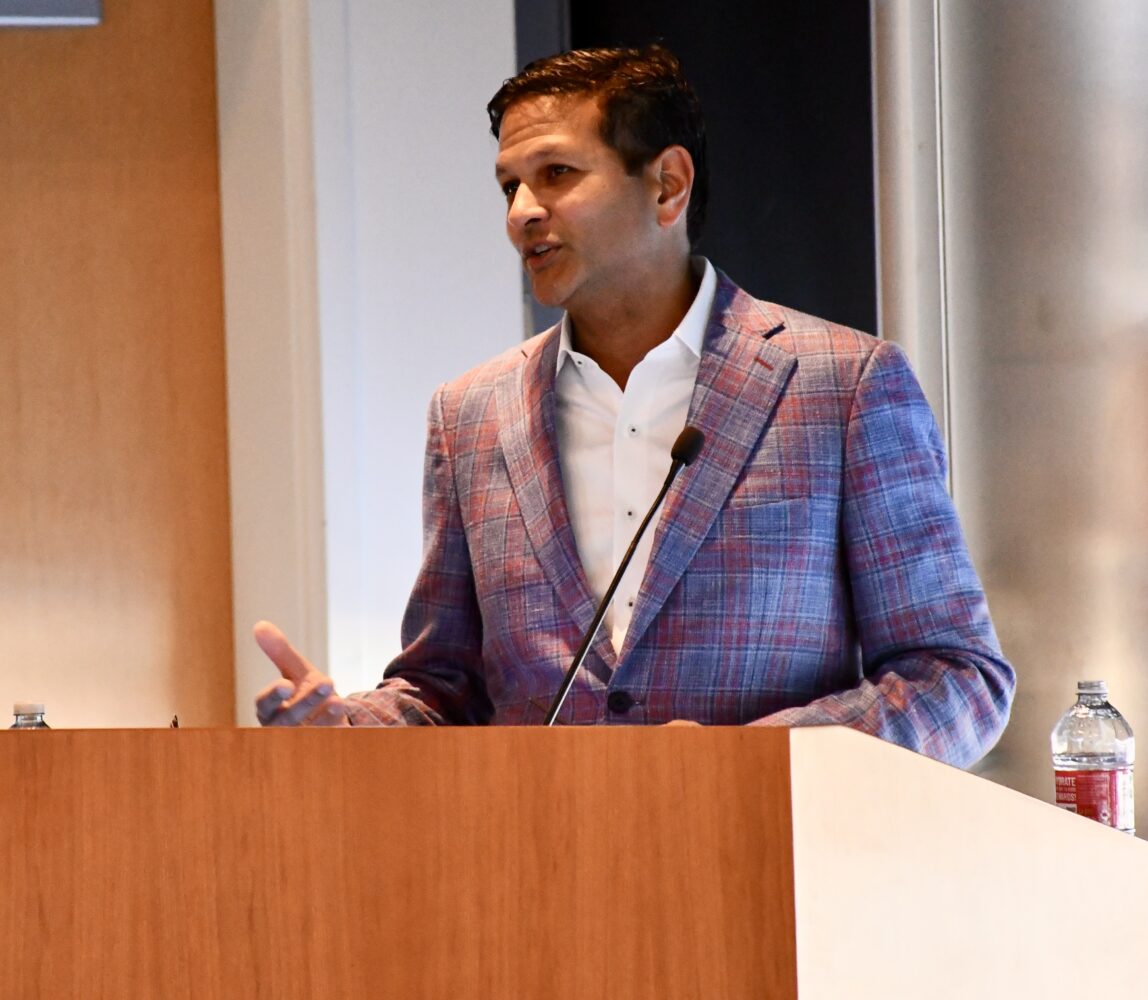
Combat medicine breakthroughs are reshaping civilian trauma care
Vik Bebarta describing the work of the CU Anschutz Center for COMBAT Research during a presentation at ScienceWriters2023 Oct. 8. (Photo courtesy of Laura Kelley, University of Colorado Anschutz Medical Campus)
On Oct. 17, 2005, during the Iraq War, a U.S. Bradley Fighting Vehicle was struck by an improvised explosive device. With their vehicle disabled and engulfed in flames, the soldiers within found themselves struggling to escape.
One of them, Sgt. 1st Class Alwyn Cashe, managed to remove himself and, drenched in fuel, moved immediately to extract those still inside. With little thought for his own safety, he was able to bravely extract six soldiers and an interpreter from the wreckage. Sustaining burns on nearly 72% of his body, he would die not a month later at Brooke Army Medical Center in San Antonio, Texas. For his valor, he would posthumously receive the Congressional Medal of Honor.
In an Oct. 8 CASW New Horizons in Science session held in Aurora, Colo., as part of the ScienceWriters2023 conference, Vik Bebarta recounted providing care for Sgt. Cashe after the incident. “I realized when I took care of him, we could have done a lot better,” said Bebarta, a physician and director of the University of Colorado Anschutz Medical Campus’s Center for COMBAT Research.
Combat medicine is often focused on acute mental and physical care in response to trauma. But as Bebarta highlighted, the same medical dilemmas arise in civilian American emergency departments and ICUs, offering the potential for a mutually beneficial relationship in which each can inform the other to improve care in their respective settings. The Center for COMBAT Research bridges the gaps between clinical research, combat casualty care, and civilian emergency medicine.
The Center provides a rich pool of resources and settings that research teams can pull from to advance the field, improving care not only for soldiers, but for civilians experiencing trauma and needing acute care. Already, a number of the center’s work has been implemented across the country, with much more to follow.
As an example, Bebarta highlighted the SAVE O2 clinical trial, which seeks ways to reduce the amount of oxygen used during trauma therapy in hospital settings. Although the trial was originally designed to optimize care in combat settings, where limited space limits the amount of oxygen that can be carried, the research also had important implications for civilian clinical settings, where space is a lesser concern.
The trial found that for the vast majority of trauma patients, around 95%, room air is sufficient for treatment. This stands in stark contrast to current ICU practices, where it is common to provide oxygen to every patient admitted. Implementation of the trial’s findings could improve the efficiency of civilian hospitals by lowering the cost and logistical challenges created by current oxygen use practices.
The ability to provide high-quality research and quick clinical implementation remain central to the center’s goals of integrating new findings into current practices, Bebarta said, with translation of findings from bench to battlefield and bedside driven by a strong team and established connections with both academic institutions and government organizations such as the U.S. Department of Defense. As Bebarta put it, “We’re impatient. There’s a pressing need, people are dying and getting sick, and it’s not fair to wait 17 years.”
It was clear from his presentation that Bebarta’s passion for his work grew from his own experiences in combat settings. He is a decorated colonel in the U.S. Air Force Reserve, working in the Office of the Chief Scientist, and has had four combat deployments in Afghanistan and Iraq.
“Acute trauma care is important,” said Bebarta. “I realized we can do better. I want to make that my passion, and I found a team of people that wanted to do the same thing. This campus has been remarkably supportive of this work.”